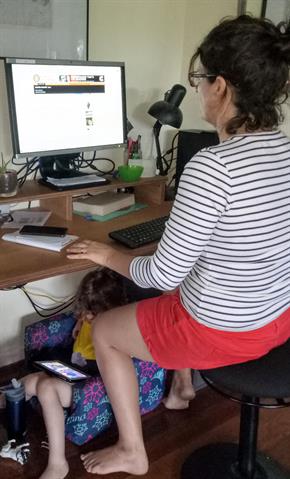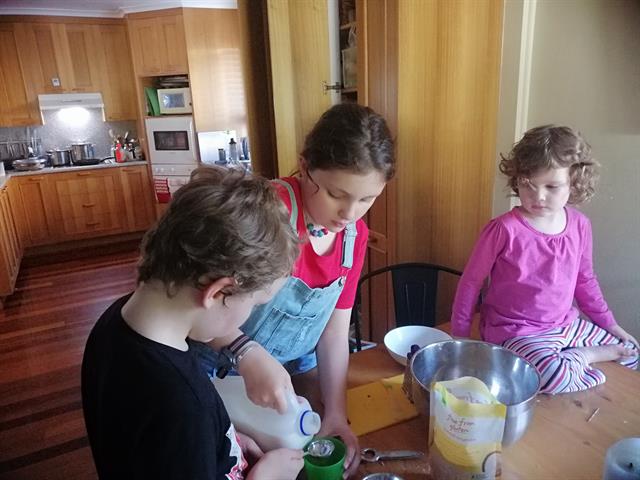Since having children, I have spent a lot of time in my working life striving for something I now realise doesn't really exist.
The concept of work-life balance implies that there is some sort of blueprint for success. Apply these steps to the work column and these steps to the life column and bingo: enlightenment, scone baking, yoga habits, off the charts work productivity, etc.
But as all parents know, what works once will invariably not work in a week's time or when applied to another child. Just as you think you have it all figured out, something will change (a sudden shift in maturity, a new school commitment, your capacity to deal with the mayhem). The goalposts are constantly shifting.
 Sometimes it's the messy compromises that allows me to get some work done. |
During the past few weeks, like so many of us, I have juggled lesson plans with my seven and ten-year-old, negotiations around iPad usage with my three-year-old, and some semblance of productivity at work (and I just burned dinner while writing this very sentence!).
I have been reminded that there is no secret formula for 'success'. Maybe it's time to take restrictive ideas around work-life balance and, in the words of Elsa of Arendelle, just 'Let it go' (sorry parents, you are now destined to have this song circulating in your head for the remainder of the day, my commiserations).
In a
World Economic Forum podcast about how work will change after COVID-19, organisational psychologist Adam Grant offers a more nuanced and attainable solution.
He suggests that our idea of what constitutes 'balance' needs to be stretched out over a longer period. He uses the period of a week as an example, explaining there are some days when work is your focus and you mostly ignore your kids; on other days, you are more often in 'family mode' and work takes a back seat. He suggests that maybe instead of work-life balance we could consider 'work-life rhythm' as a healthier goal.
For me personally, I have plenty of days when things get out of kilter, work obligations are not met or kids are descending into chaos (why does the latter always happen when you are on the phone?).
There are a few things that help me to deal with the 'rollercoaster' whilst allowing me to be in a better headspace when I am able to work uninterrupted.
Don't just add work items to your to-do listYou don't work in a vacuum, and your to-do list should reflect this. Mine has my work tasks and family plans (including the fun ones, not just obligations) all in the one place. I try to limit the work to-dos to just a few; I can always add more tasks later if miracles happen.
I also make note of how much energy these tasks will require. I know I will be struggling by the end of the day so I try to make sure anything requiring a lot of focus is done earlier.
Interruptions and procrastination aren't always a bad thingThe other day, my son was in the middle of a task that required his full concentration when he abruptly announced "I am going for a bounce" and he promptly took himself off for a quick jump on the trampoline before coming back refreshed. I think he had the right idea.
Here's another example: yesterday, my Internet was playing up. Rather than stressing about work that wasn't getting done, I made the decision to attempt cooking a tomato relish recipe I had been dying to try. It was such a respite and when I finally got back to work, I felt energised and productive.
 A good 'interruption' to the work day can actually help me regroup later with more focus. |
|
I often find myself getting stressed out at all the little interruptions that arise when working from home with a young family. But then I remind myself that breaks to enjoy the outdoors or even just to do a quick puzzle or game with the kids frequently give me that little boost that allows me to regroup with more focus.
Silence is goldenI have found this one a game-changer. With so much noise in my house all the time and so many competing demands on my attention (not just from the kids, but the news cycle, social media, emails, etc.), if I just take a few moments at the beginning of the day to prioritise peace and quiet, my mental wellbeing is so much stronger for it.
Yes, my three-year-old is watching TV to allow me this time to enjoy a quiet cup of tea and a few yoga stretches, but I guarantee that everyone benefits from it.
A pat on the back at the end of the day isn't just earned, it's essentialSome days I feel that I have kicked some goals at work but this is undermined by guilt for yelling at the kids. Other days, I might succeed in playing with the kids, but not at much else. No matter how my day goes, I try to give myself a break.
So often, we are our own harshest critics. This negative second-guessing and striving for perfection will not make us a better worker or a better life liver.
Do you think we should give up on work-life balance? What things help you negotiate your work and home life without losing your sanity? We'd love to hear from you
in the forums, or
send us an email.